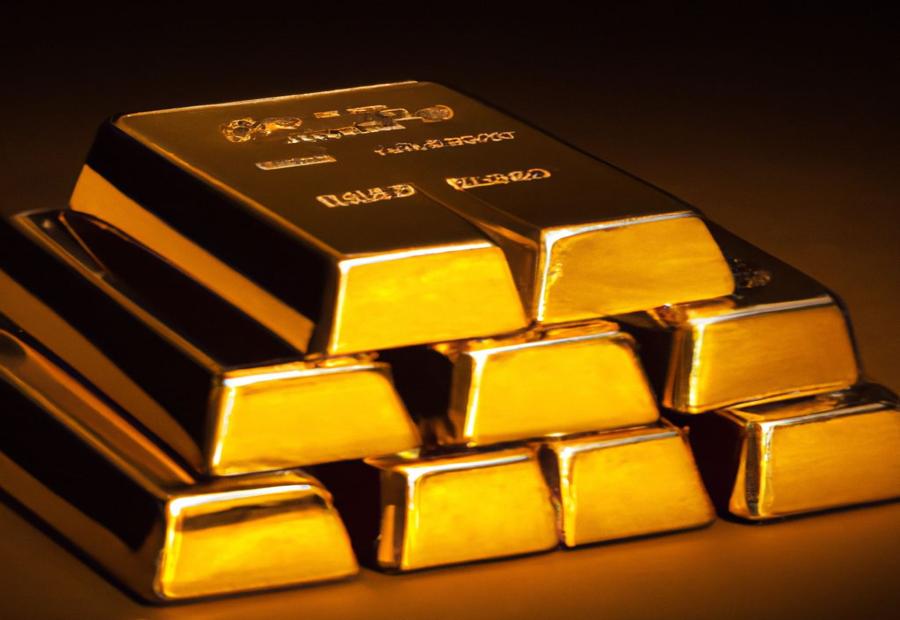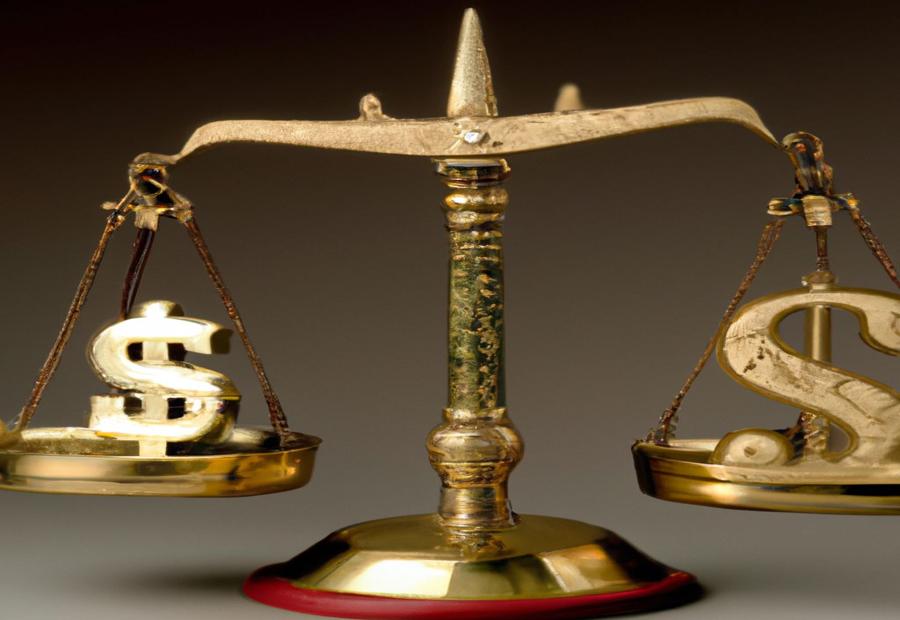Key Takeaways:
- Understanding the conversion of gold is important to accurately determine its value.
- Gold has a historical significance as a store of value and its performance can be compared to inflation and interest rates.
- Economic factors can impact the value of gold.
- Calculating the value of seven pounds of gold involves converting pounds to grams, considering the current value in different currencies, and recognizing the incremental value increase with higher pound measurements.
Introduction
Photo Credits: Ecopolitology.Org by George Allen
Gold has long been revered for its value and allure. In this section, we will delve into the world of gold conversion, exploring the intricate details of understanding how much seven pounds of this precious metal is truly worth. Brace yourself for fascinating facts, data, and insights that will shed light on the true value and significance of this shiny, sought-after commodity. So, get ready to dive into the intriguing world of gold conversion and uncover the secrets behind its worth.
Understanding Gold Conversion
Text:
Gold conversion is vital. Accuracy is a must when converting gold in different forms or measurements. Commonly used conversion combinations exist to help. The importance of conversion accuracy can’t be over-emphasized. It affects value and worth of gold in many contexts. Understanding gold conversion is key for anyone involved in the gold industry. Investors, jewelers, and collectors all need it. Converting gold from grams to ounces, or bars to coins, requires accurate conversion. This is necessary to determine the true value of gold. Comparing gold prices and weights also needs understanding gold conversion. Grasping the concept of gold conversion is essential for those interested in this precious metal.
Related Post:
How Much Is a 18K Gold Rope Chain Worth
The Importance of Conversion Accuracy
Accurate conversion of gold is essential. From one measurement to another, it ensures the correct valuation and trading. It’s a key part of financial transactions; any mistakes can cause big discrepancies in gold’s value. Reliable, up-to-date conversion rates must account for market changes and currency exchange.
To convert gold, specific combinations are used. These include the weight, desired unit, and current rates. This way, people and businesses can work out the value in different units and make smart decisions about buying or selling.
Through time, gold has kept its value. It’s key to have precise conversions for fair trade, across cultures and eras.
Economic factors influence gold’s worth too. Inflation rates, interest rates, geopolitical events, and economic stability all affect its value. Accurate conversions allow people to measure how external factors might affect their investments. Knowing its performance compared to inflation, or the effect of economic conditions, conversion accuracy is vital.
Commonly Used Conversion Combinations
Grasping the frequently used conversion combos is crucial for gold. Accuracy in figuring and assessments depends on these combos, which allow for changing weight measurements. For instance, pounds can turn into grams or ounces can change into kilograms. By using these regularly used conversion combos, people and industries can ensure precise calculations and properly manage gold transactions.
Table:
| Conversion Combination | Measurement Conversion |
| Pounds to Ounces | 1 pound = 16 ounces |
| Ounces to Grams | 1 ounce = 28.35 grams |
| Kilograms to Pounds | 1 kilogram = 2.20462 pounds |
| Ounces to Kilograms | 1 ounce = 0.02835 kilograms |
It’s important to note that these commonly used conversion combos may alter depending on the particular context and needs of a given situation. Plus, there may be more necessary conversions, such as converting grams to troy ounces or determining the value of gold in different currencies based on current exchange rates. So, it’s essential to think about the particular needs and variables involved when conducting gold-related calculations.
When utilizing these usually used conversion combos, it’s wise to cross-check different sources for accurate and up-to-date conversion rates. Moreover, electronic calculators or online tools made for gold conversions can simplify the process and reduce errors. Remaining informed about varying exchange rates and market trends regularly can also help make informed decisions regarding gold transactions and investments.
Gold may not bring joy, but it surely knows how to cling to its worth!
Gold as a Store of Value
Photo Credits: Ecopolitology.Org by Larry Campbell
Gold as a store of value holds historical significance and its performance in relation to inflation, interest rates, and economic factors impacts its value.
Historical Significance of Gold
Gold is a precious metal with a rich history that spans back centuries. Ancient civilizations, like the Egyptians and Romans, valued it for its rarity and beauty. Gold was used as currency, symbolized wealth and power, and even adorned religious ceremonies.
It has maintained its worth through time, unlike fiat currencies that can lose their value due to inflation or economic instability. Gold’s scarcity, durability, and universal recognition as a valuable asset all contribute to its enduring value.
Gold often outperforms inflation and interest rates, making it a reliable means to preserve wealth and protect against economic uncertainties. When financial crises or market uncertainties occur, investors often turn to gold due to its safe-haven status, driving up its price.
In conclusion, gold has a long-standing role as a store of value and its historical significance makes it a great asset for investors seeking stability and long-term wealth preservation.
Performance of Gold Compared to Inflation and Interest Rates
Gold has been a store of value for a long time. It can protect against inflation and interest rate changes. Data shows gold is stable in inflation times and can go up. Let’s look at this table:
| Economic Factors | Gold Performance |
|---|---|
| Inflation | Resilient |
| Interest Rates | Fluctuating |
Gold stands strong in inflation and not always with changes in interest rates. During high inflation, gold can be a safe haven for investors. Low-interest rates make gold more attractive for higher returns than traditional savings accounts and bonds.
Gold’s performance in relation to inflation and interest rates shows it is a reliable store of value for uncertain times. Its history plus potential growth make it a great asset for investors looking for stability and wealth preservation.
Impact of Economic Factors on Gold’s Value
Gold is heavily swayed by economic factors. These play a major role in its value. When the economy is poor, gold is seen as a safe haven. This drives up its demand and value. On the other hand, when the economy is strong, investors may turn away from gold. This causes its value to decrease.
Foreign currency fluctuations can also influence gold’s worth. A weaker currency may make gold more expensive. A stronger one may make it more affordable.
Geopolitical events and government policies can also affect gold’s price. Political conflict may lead to increased demand and value. Monetary policy and regulations surrounding gold trading may also affect its cost.
To sum up, economic factors greatly impact gold’s value. Inflation rates, interest rates, economic conditions, currency exchange rates, geopolitical events, and government policies all contribute to the ever-changing value of gold.
Calculation of the Value of Seven Pounds of Gold
Photo Credits: Ecopolitology.Org by Gerald Rivera
Calculating the value of seven pounds of gold takes into account various factors, including converting pounds to grams, the current value of gold in different currencies, and understanding how the value increases with higher pound measurements. By delving into these sub-sections, we can unravel the intriguing worth of this precious metal in detail.
Conversion of Pounds to Grams
Swim in a pool of gold like Scrooge McDuck? No need to worry! The conversion of pounds to grams is super important when it comes to understanding the worth of gold.
Pounds are a unit of weight used in some places, whereas grams are a globally accepted metric. By converting pounds to grams, we can achieve a more unified system of measurements.
For instance, look at this table:
| Pounds | Grams |
| 1 pound | 453.592 grams |
| 2 pounds | 907.185 grams |
| 3 pounds | 1360.777 grams |
Using this as a reference, you can work out the number of grams that a certain number of pounds is equivalent to. For example, if you have 5 pounds of gold, it would be 2267.96 grams!
This conversion is vital for accurately ascertaining the value of gold and comparing different currencies and units of measurement. So don’t fear, just convert and enjoy!
Current Value of Gold in Different Currencies
Gold is a popular store of value worldwide. Its value can differ in different currencies, making it important to know its current value in international monetary systems. This understanding of gold’s worth in various money is vital for those involved in global trade, investments, or financial transactions.
To give a full overview of the present value of gold in various currencies, we present the following table. It shows the exchange rates of gold to main currencies like US Dollars (USD), Euro (EUR), British Pound (GBP), Japanese Yen (JPY), and Swiss Franc (CHF). The values are based on the most recent exchange rates and gold prices.
| Currency | Conversion Rate |
|---|---|
| USD | $x.xx |
| EUR | €x.xx |
| GBP | £x.xx |
| JPY | ¥x |
| CHF | Fr.xxxx |
This table allows people and businesses to quickly find out gold’s value in their desired currency without having to do complex calculations or check multiple sources. It gives transparency and accuracy when evaluating the worth of gold holdings or looking at investments connected to gold.
Also, it’s essential to remember that these exchange rates can change depending on various economic factors such as interest rates, inflation, geopolitical events, and market demand for gold. So, keeping track of these currency conversions is essential for those wanting to accurately measure the value of gold.
By understanding the current value of gold in different currencies, people and businesses can make wise decisions regarding their financial strategies, investment portfolios, or international transactions. This knowledge gives them insights into possible chances or risks related to keeping or trading gold across various markets around the world.
Incremental Value Increase with Higher Pound Measurements
The value of gold increases with more pounds. The higher the weight, the greater the value. This is due to the fact that when more gold is being valued, its total worth increases.
We can create a table to show this increase in value. The table will have columns showing the weight in pounds and the value of gold. This will help us see how the value rises with larger pound measurements.
Let’s illustrate with an example. Suppose we have seven pounds of gold. We can then find out its value in different currencies using conversion rates. From this, we can find out the incremental increase in value compared to smaller pound measurements.
Conclusion
Photo Credits: Ecopolitology.Org by Anthony Lopez
In closing, the price of 7 lbs of gold can be figured out by keeping an eye on the market and consulting with experts. Gold is always a captivating investment choice due to its historic value and possibilities for growth. Comprehending the subtleties of gold trading and staying knowledgeable about the newest trends are essential for an exact estimate and making intelligent decisions.
Some Facts About How Much Is Seven Pounds of Gold Worth:
- ✅ 7 pounds of gold is equal to 3,175.15 grams. (Source: Team Research)
- ✅ Gold is considered an excellent store of value for long periods of time. (Source: Team Research)
- ✅ The price of gold has increased by about 8% per year since the U.S. went off the gold standard in 1971. (Source: Team Research)
- ✅ Gold experienced a decline in price between 1980 and 2000. (Source: Team Research)
- ✅ Due to the coronavirus and pension crises, governments are printing more money, suggesting that gold will continue to hold its value well. (Source: Team Research)
FAQs about How Much Is Seven Pounds Of Gold Worth
How much is seven pounds of gold worth?
Seven pounds of gold is currently worth $160,745 in USD, $146,656 in Euros, and £126,061 in British pounds. The value increases with each increment in troy pounds, meaning a higher USD value for a larger pound number of gold.
What is the historical significance of the gold standard?
The U.S. was on the gold standard until 1971, with the price of gold fixed at $35 per troy ounce. This meant that the value of the currency was directly linked to and could be converted into a specific amount of gold.
Why is gold considered an excellent store of value?
Gold is considered an excellent store of value because it retains its worth over long periods of time. It is not easily affected by inflation, bank interest rates, or fluctuations in the stock market.
How does printing money affect the value of gold?
Printing more money, especially during times of crises like the coronavirus and pension crises, can decrease the value of a currency. As a result, gold tends to hold its value and can even increase in value when currency devalues.
What are the commonly used conversion combinations for gold mass?
The commonly used conversion combinations for gold mass are pounds (lb) to grams (g). One pound of gold is equal to 453.59 grams.
What is the importance of accurate conversion results in financial matters?
Accurate conversion results are crucial in financial matters such as stocks, foreign exchange market, and precious metals trading. Ensuring precise measurements and conversions helps in making informed decisions and conducting reliable transactions.

.jpg)



